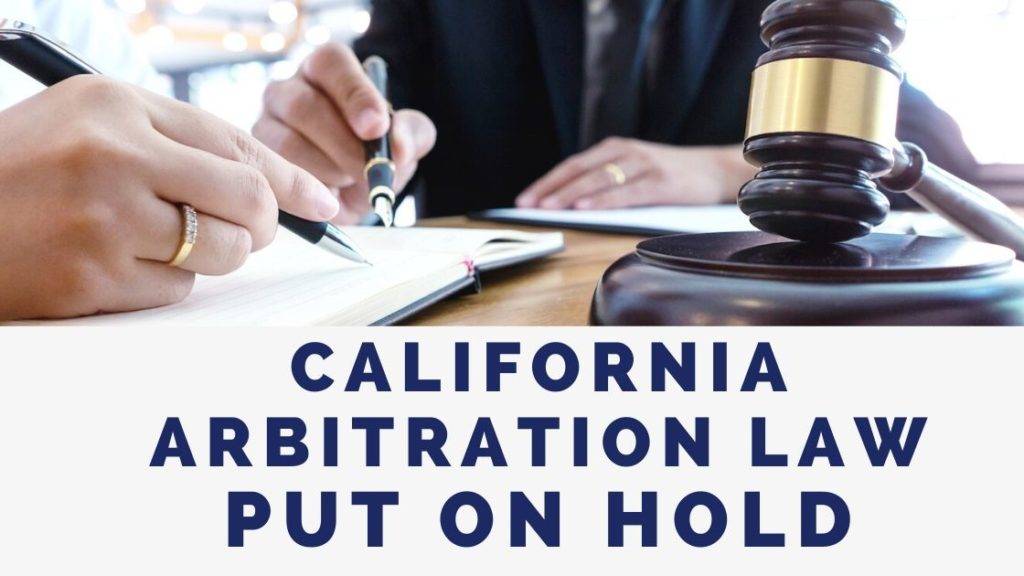Among the laws that were predicted to impact employers in 2020 is AB-51. This bill was written to restrict employers from forcing employees to mandatorily sign arbitration agreements.
This article from the Society for Human Resource Management (SHRM) discusses recent developments on the implementation of AB-51:
The fate of a California bill that restricts the use of employment arbitration agreements is still unknown following the latest development in a legal fight between the state and the business community.
California lawmakers passed AB 51 last year, citing concerns that employers are depriving workers of justice when they require arbitration to resolve workplace disputes. AB 51 was scheduled to take effect on Jan. 1, but a federal judge temporarily halted the new law while litigation over its enforcement ensues.
The bill was challenged by the California Chamber of Commerce and other business groups that filed a lawsuit claiming that the bill conflicts with the Federal Arbitration Act (FAA). Until the legal battle is resolved, employers need to navigate murky waters to decide how they want to proceed on workplace arbitration agreements.
Background
The state bill aims to protect the rights of job applicants and employees to pursue claims related to the California Fair Employment and Housing Act (FEHA) and the California Labor Code. Under the bill, companies wouldn’t be allowed to force these individuals to sign arbitration agreements as a condition of employment covering these types of claims.
According to the Economic Policy Institute, nearly 54 percent of nonunion private companies use mandatory arbitration contracts.
In 2018, a bill with similar provisions—AB 3080—was rejected by former Gov. Jerry Brown. In vetoing that bill, he said the measure violated federal legislation. In a number of cases, the U.S. Supreme Court has embraced mandatory workplace arbitration pacts, citing the FAA. Nevertheless, the California Legislature didn’t give up on the cause. In October 2019, current Gov. Gavin Newsom signed AB 51, which was authored by Assemblywoman Lorena Gonzalez, D-San Diego.
According to the text of AB 51, the California Legislature is trying to ensure that people have access to the “full benefit of the rights, forums, and procedures” established in FEHA and the Labor Code.
Under the bill, voluntary arbitration agreements are permitted. In a statement issued last October, Gonzalez said: “AB 51 will protect vulnerable workers from being forced to waive their rights, and it will prohibit employers from threatening, retaliating, discriminating against, or terminating workers because they refuse to consent to such a waiver.”
Notably, AB 51 also has a provision that states: “Nothing in this section is intended to invalidate a written arbitration agreement that is otherwise enforceable under the Federal Arbitration Act.”
If the bill is deemed enforceable, it will only apply to employment arbitration contracts that are created or modified after Jan. 1, 2020.
“This statute essentially is a massive disincentive against forming mandatory arbitration agreements with class- and collective-action waivers,” said Esra Hudson, an attorney with Manatt Phelps & Phillips in Los Angeles.
Tips for Employers
California businesses should monitor ongoing developments in the case, Hudson said. In light of court rulings so far, employers have the right to continue to use arbitration agreements—as long as those pacts are covered by the FAA, and as long as employees aren’t exempt from the federal law, said attorney George Abele, an attorney with Paul Hastings in Los Angeles.
Some arbitration contracts are written in a way that invokes state arbitration law, as opposed to the FAA, Abele noted.
Determining whether an agreement is covered by the FAA requires a detailed legal analysis, said Danielle Ochs, an attorney with Ogletree Deakins in San Francisco.
Attorneys recommend that employers consult legal counsel on this matter. If the arbitration contract is deemed to be covered by the federal law, then the agreement should include a provision stating that enforcement of the pact is governed by the FAA, attorneys said.
Jennifer Rubin, an attorney with Mintz in San Diego, recommends adding a statement at the top of the arbitration contract informing employees that the agreement is intended to comply with California Labor Code Section 432.6—which was added as a result of AB 51—and will be interpreted in accordance with existing law.
So, until the legal fight is resolved, how should businesses proceed for employees hired after Jan. 1? Companies have a variety of approaches, lawyers noted. While some employers are continuing to use mandatory arbitration contracts for new hires, others are choosing voluntary agreements. However, some employers have opted not to use arbitration agreements at all for new workers until the legal issues are sorted out.
If the business groups prevail in the court system, then employers that have been shunning mandatory arbitration pacts for new hires might decide to change course, according to Abele. If the legal issues are decided in employers’ favor, then such companies could go back and implement arbitration contracts for those workers, he said.
According to Rubin, it’s a good idea to inform new hires about their rights pertaining to workplace arbitration contracts. “It’s always prudent to offer individuals the ability to negotiate agreements and to ask questions about the agreements,” she emphasized.
For more employment legal updates and HR news, visit SHRM.org.

